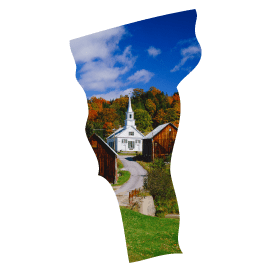Alternate Route Usage and Providers: Vermont
Expanding the Pool of Teachers Policy
Analysis of Vermont's policies
Vermont limits the usage and providers of its alternate route.
Vermont's alternate route can only be used for certification to teach elementary education, 7-12 English, 7-12 Science, 7-12 Social Studies, 7-12 Mathematics, Art, Physical Education, Modern and Classical Languages, and Middle Grades (5-9).
Although the state permits school districts to operate Peer Review programs, it does not permit a diversity of providers to offer alternate route preparation programs.
Recommendations for Vermont
Broaden alternate route usage.
Vermont should reconsider grade-level and subject area restrictions on its alternate route. Alternate routes should not be programs of last resort for hard-to-staff subjects, grade levels or geographic areas but rather a way to expand the teacher pipeline throughout the state.
Encourage diversity of alternate route providers.
Vermont should specifically authorize alternate route programs run by local school districts and nonprofits, as well as institutions of higher education. A good diversity of providers helps all programs, both university- and non-university-based, to improve.
State response to our analysis
Vermont asserted that it offers additional alternate routes to the Peer Review process. The state contended that it does not limit who can run an alternate route program. Further, the state explained that "candidates can apply directly to the state for Peer Review and that alternate routes are open to all endorsement areas except for those requiring an additional professional license (e.g. school nurse, school language pathologist)."
Last word
In previous editions of the Yearbook, as in this one, Vermont has disagreed with NCTQ's analysis that it limits the usage and providers of its alternate route. The state has not provided NCTQ with additional documentation to verify the state's response. No reference to other routes or providers could be identified in state statute or regulation.
Select another topic
Delivering Well Prepared Teachers
- Admission into Preparation Programs
- Elementary Teacher Preparation
- Elementary Teacher Preparation in Reading Instruction
- Elementary Teacher Preparation in Mathematics
- Middle School Teacher Preparation
- Secondary Teacher Preparation
- Secondary Teacher Preparation in Science
- Secondary Teacher Preparation in Social Studies
- Special Education Teacher Preparation
- Assessing Professional Knowledge
- Student Teaching
- Teacher Preparation Program Accountability
Expanding the Pool of Teachers
Identifying Effective Teachers
- State Data Systems
- Evaluation of Effectiveness
- Frequency of Evaluations
- Tenure
- Licensure Advancement
- Equitable Distribution

